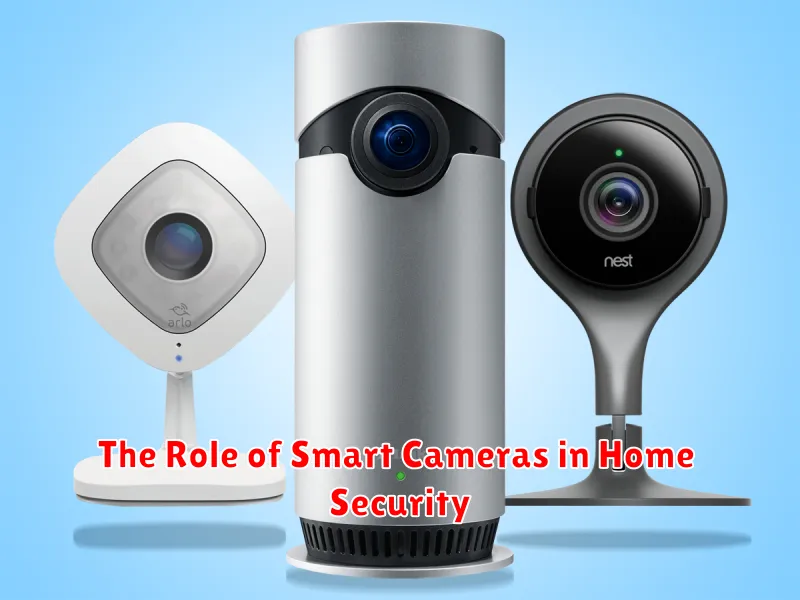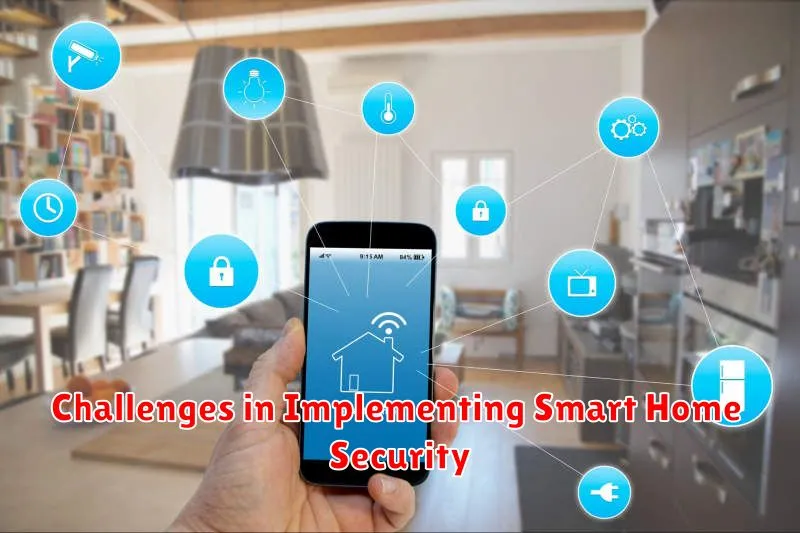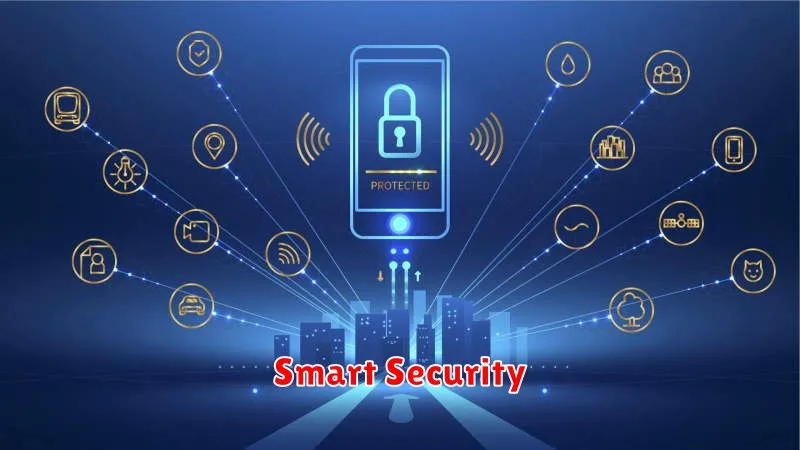In today’s increasingly connected world, security is paramount. As we embrace the convenience of smart devices, our homes are becoming more vulnerable than ever before. But what if technology could be the solution, not the problem? The future of home security lies in the hands of smart devices, offering a comprehensive and proactive approach to safeguarding our loved ones and belongings.
From smart locks and security cameras to motion sensors and alarm systems, the landscape of home security is being transformed by the power of artificial intelligence and internet of things (IoT) technology. These innovations are not just about convenience, they are about empowering homeowners with real-time awareness and control, allowing them to take proactive measures to prevent crime and ensure peace of mind.
The Role of Smart Cameras in Home Security

Smart cameras are quickly becoming an indispensable part of modern home security systems. They offer a range of features that enhance home safety and provide peace of mind for homeowners. Real-time monitoring allows users to keep an eye on their property from anywhere with an internet connection, while motion detection triggers alerts when activity is detected, potentially deterring intruders and providing evidence in case of a crime.
Two-way audio capabilities enable communication with visitors or potential threats, allowing homeowners to deter unwanted activity or check on deliveries. Cloud recording ensures footage is stored securely and accessible for review, even if the camera itself is damaged or stolen. Additionally, night vision provides clear footage even in low-light conditions, expanding the effectiveness of the camera throughout the day and night.
Smart cameras also offer a range of features that enhance the overall security of a home. Integration with other smart home devices allows for automated responses to security threats. For example, smart lights can be programmed to turn on when motion is detected, while smart locks can be remotely controlled to secure the home.
The role of smart cameras in home security is rapidly evolving. With advancements in technology, we can expect even more innovative features and capabilities in the future. From facial recognition to advanced analytics, smart cameras are poised to play an increasingly critical role in keeping our homes safe and secure.
How to Set Up a Smart Security System
Setting up a smart security system can significantly enhance your home’s safety and provide you with peace of mind. Here’s a comprehensive guide to getting started:
1. Choose the Right System
The first step is to select a smart security system that meets your needs and budget. Consider factors such as:
- Features: Do you need basic security, motion detection, door/window sensors, or advanced features like video surveillance?
- Compatibility: Ensure the system is compatible with your existing home devices and network.
- Professional Installation: Some systems require professional installation, while others are DIY-friendly.
2. Install the System
Once you’ve chosen a system, follow these steps for installation:
- Connect the Hub: Install the central hub, which acts as the brains of the system.
- Place Sensors: Strategically place sensors on doors, windows, and other vulnerable areas.
- Connect to Wi-Fi: Connect the hub to your home’s Wi-Fi network.
- Download the App: Download the accompanying smartphone app to manage and control the system.
3. Customize Settings
After installation, customize the system’s settings according to your preferences:
- Set Up Zones: Define areas of your home that require different levels of security.
- Schedule Automation: Automate actions like locking doors or turning on lights based on specific times or events.
- Configure Notifications: Customize the types of notifications you receive (e.g., motion detection, door opening, system arming).
4. Monitoring and Maintenance
Once your smart security system is up and running, regularly monitor it for any issues and perform maintenance:
- Check Battery Levels: Ensure sensors have sufficient battery power.
- Test Alarms: Periodically test the alarm system to ensure it’s functioning correctly.
- Update Firmware: Keep your system’s software up to date for security patches and new features.
The Benefits of AI in Home Security
Artificial intelligence (AI) is rapidly transforming the home security landscape, offering numerous benefits that enhance our safety and peace of mind. AI-powered security systems utilize advanced algorithms and machine learning to analyze data, detect anomalies, and respond to potential threats in real-time.
One of the most significant benefits of AI in home security is enhanced threat detection. AI algorithms can analyze video feeds from security cameras, identifying suspicious activity such as unauthorized entry, unusual movements, or potential hazards. This enables quicker and more accurate threat assessment, allowing for immediate response and prevention of incidents.
Another advantage is personalized security. AI systems can learn your habits and routines, tailoring security measures to your individual needs. For example, they can differentiate between family members and strangers, reducing false alarms and providing a more tailored security experience.
Moreover, AI-powered systems offer proactive security. By analyzing historical data and patterns, AI can predict potential risks and take preventive actions. This could include adjusting security settings, alerting authorities, or even notifying you of potential dangers before they occur.
Finally, AI simplifies remote management. With AI-powered systems, you can easily monitor and control your security system from anywhere using a smartphone app. This allows for convenient access to live feeds, alerts, and system settings, giving you greater control over your home security.
In conclusion, AI is revolutionizing home security by providing enhanced threat detection, personalized security, proactive measures, and remote management capabilities. By leveraging the power of AI, we can create safer and more secure homes for ourselves and our loved ones.
Top Smart Security Devices for 2024
As technology continues to evolve, home security is becoming more advanced and user-friendly. Smart security devices are revolutionizing how we protect our homes, offering real-time monitoring, automation, and enhanced peace of mind. Here are some of the top smart security devices expected to be popular in 2024:
Smart Doorbells
Smart doorbells have become an essential part of any home security system. They offer video recording, two-way audio, and motion detection, allowing you to see and speak to visitors, even when you’re not home. Look for doorbells with features like:
- High-definition video for clear footage
- Night vision for visibility in low-light conditions
- Cloud storage for recording and reviewing events
- Advanced motion detection to minimize false alerts
Smart Security Cameras
Smart security cameras provide comprehensive surveillance for your home, both indoors and outdoors. Features to consider include:
- Wide-angle lens for a broader field of view
- Pan-tilt-zoom (PTZ) capability for remote control of camera direction
- Two-way audio for communication with potential threats
- AI-powered detection to differentiate between humans, animals, and objects
Smart Locks
Smart locks offer keyless entry and remote access to your home, allowing you to grant access to family members, guests, or service providers. Look for smart locks with features like:
- Mobile app control for locking and unlocking remotely
- Automatic locking for enhanced security
- Keyless entry using a code or fingerprint
- Integration with other smart home devices for seamless control
Smart Smoke Detectors
Smart smoke detectors provide early warning in case of fire, potentially saving lives and property. Features to consider include:
- Interconnected network for alerting all detectors in the home
- Mobile app notifications for alerts even when you’re away
- Voice integration for hands-free control
- Carbon monoxide detection for added safety
Smart Lighting
Smart lighting systems offer a convenient and energy-efficient way to control your home’s lighting. They can be integrated with security systems to provide an extra layer of protection. Look for smart lights with features like:
- Motion detection to automatically turn on lights when someone enters a room
- Schedules to set lights to turn on and off at specific times
- Remote control via a mobile app or voice assistant
- Dimming capability for setting the mood
The future of home security is bright, with smart devices offering increasingly sophisticated and user-friendly solutions. By incorporating these top devices into your home security setup, you can significantly enhance your peace of mind and protect your valuable assets.
Challenges in Implementing Smart Home Security

While smart home security offers numerous advantages, there are several challenges that need to be addressed for its successful implementation. One of the main concerns is cybersecurity. Smart devices are connected to the internet, making them vulnerable to hacking and data breaches. It’s crucial to ensure that devices have strong security features and are updated regularly to mitigate these risks.
Another challenge is compatibility. Different smart home devices often use incompatible protocols and platforms, making it difficult to integrate them into a single system. This fragmentation can lead to a lack of interoperability and make it challenging to manage and control the entire security system.
Privacy is also a major concern. Smart home devices collect a vast amount of personal data, including location information, usage patterns, and even audio and video recordings. Ensuring that this data is collected, stored, and used responsibly is crucial to protecting user privacy.
Finally, reliability is essential for effective security. Smart home devices should be reliable and function correctly even in challenging conditions, such as power outages or internet connectivity issues. Maintaining a robust backup system and ensuring reliable device performance is crucial to maintain a secure home environment.
The Future of Home Security with Smart Devices
The future of home security is increasingly intertwined with the rise of smart devices. Gone are the days of simple alarm systems and clunky security cameras. Today, homeowners have access to a sophisticated ecosystem of connected devices that offer unparalleled protection, convenience, and peace of mind.
Smart home security systems are the cornerstone of this revolution. These systems utilize a network of sensors, cameras, and control panels to monitor your home for intrusions, fire, and other emergencies. The beauty lies in their integration with other smart devices, allowing you to control your home’s security from anywhere in the world via your smartphone.
Smart door locks are another game-changer. Forget fumbling with keys; these locks can be opened and locked remotely, granting access to trusted individuals or even providing temporary access to guests. They also offer features like auto-locking, keyless entry, and even facial recognition.
Smart security cameras are becoming increasingly affordable and feature-rich. These cameras offer high-resolution video, night vision, motion detection, and two-way audio communication. Some even come equipped with AI-powered features for object recognition and person detection, allowing for more targeted alerts.
Smart lighting can be a potent deterrent against intruders. By automatically switching lights on and off at pre-set times, you can create the illusion that someone is home, even when you’re away. Some smart bulbs even offer color customization, allowing you to create different lighting scenarios for added security.
The future of home security is bright, and smart devices are playing a pivotal role in shaping it. As technology continues to evolve, we can expect even more innovative solutions that enhance our safety and provide us with greater control over our homes.

